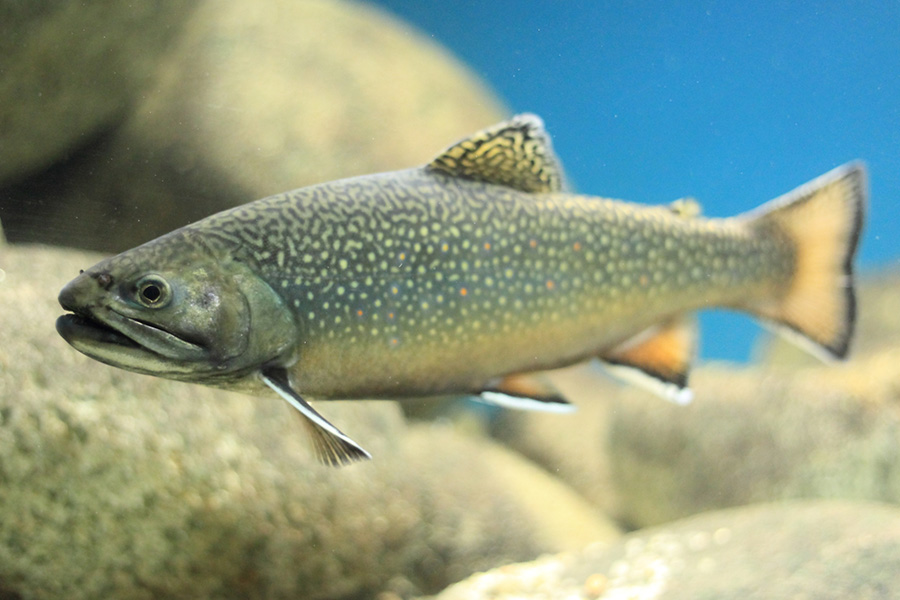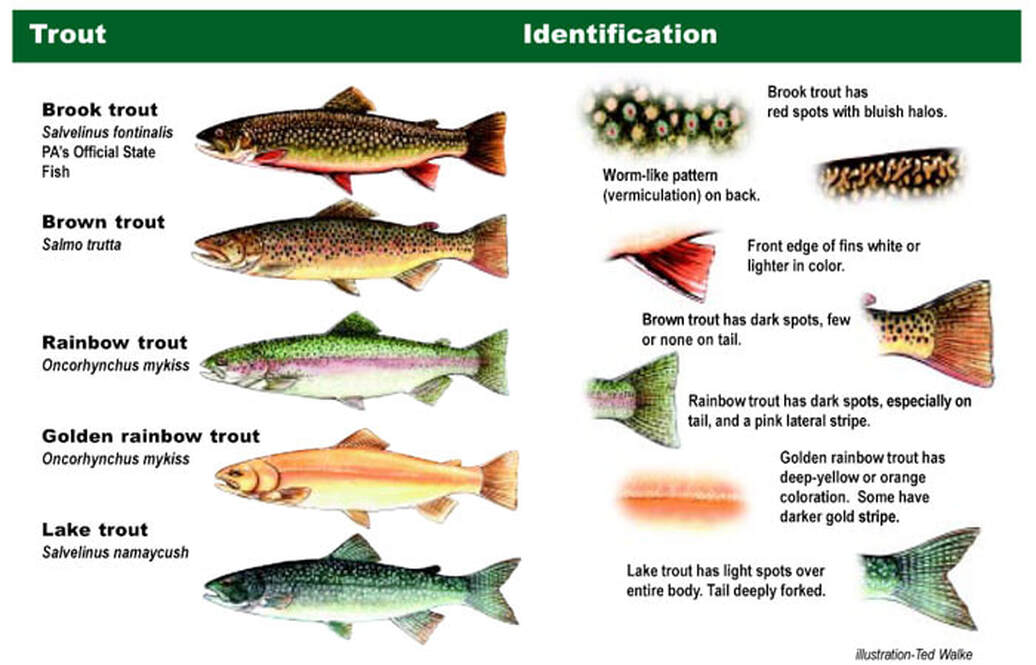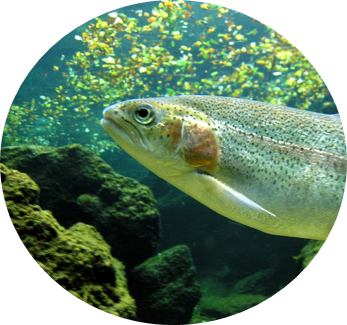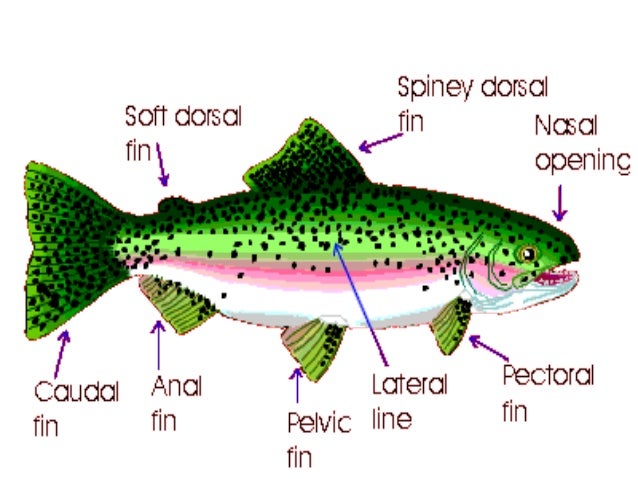Rainbow trout adaptations information
Home » Wallpapers » Rainbow trout adaptations informationYour Rainbow trout adaptations images are ready in this website. Rainbow trout adaptations are a topic that is being searched for and liked by netizens now. You can Download the Rainbow trout adaptations files here. Get all royalty-free images.
If you’re searching for rainbow trout adaptations images information linked to the rainbow trout adaptations keyword, you have come to the ideal blog. Our site frequently gives you hints for downloading the highest quality video and picture content, please kindly surf and find more informative video content and images that match your interests.
Rainbow Trout Adaptations. Recent investigations have demonstrated that rainbow trout cope with acute high pH pH 90 exposure lasting 3-8 days through their ability to counteract high-pH-induced disturbances to ammonia excretion J Amm acid-base homeostasis and electrolyte balanceIn the present investigation our goal was to establish how these physiological processes were modulated during chronic 28-day high. The back may be blue- green to olive. Rainbow trout is a member of salmon family. A multi disciplinary approach Ability of fish to adapt to changing environments and stressors is a key trait for breeders especially when they sell eggs or young fish all over the world.
 4 Morphology Of Rainbow Trout Parr A And Smolt B Download Scientific Diagram From researchgate.net
4 Morphology Of Rainbow Trout Parr A And Smolt B Download Scientific Diagram From researchgate.net
Rainbow trout also tend to have a strong migratory urge often heading off downstream almost as soon as they are put into the water. A multi disciplinary approach Ability of fish to adapt to changing environments and stressors is a key trait for breeders especially when they sell eggs or young fish all over the world. They are torpedo-shaped and generally. With this adaptation the top of the fish becomes far darker so as to make it appear to be the same colour of the water that is surrounding it. For all enzymes we have examined in this species distinct warm and cold isozymes are present. Rainbow trout is a member of salmon family.
These fish inhabit cold streams and rivers while some subspecies spend part of their life in the ocean.
For all enzymes we have examined in this species distinct warm and cold isozymes are present. The body shape and coloration vary and reflect habitat age sex and degree of maturity. Trout use fins and their tails also the shape of their body helps them. Accordingly the goal of the present study was to describe how. Z Tierphysiol Tierernahr Futtermittelkd. Recent investigations have demonstrated that rainbow trout cope with acute high pH pH 90 exposure lasting 3-8 days through their ability to counteract high-pH-induced disturbances to ammonia excretion J Amm acid-base homeostasis and electrolyte balanceIn the present investigation our goal was to establish how these physiological processes were modulated during chronic 28-day high.
 Source: phys.org
Source: phys.org
Rainbow trout are streamlined salmonid form fish. Physiological adaptations of rainbow trout to chronically elevated water pH pH 95 Michael P. There are 15 subspecies of rainbow trout that are native to western parts of North America. Rainbow trout is a member of salmon family. So far this ability has not been introduced in any breeding program.
 Source: scaquarium.org
Source: scaquarium.org
Recent investigations have demonstrated that rainbow trout cope with acute high pH pH 90 exposure lasting 3-8 days through their ability to counteract high-pH-induced disturbances to ammonia excretion J Amm acid-base homeostasis and electrolyte balanceIn the present investigation our goal was to establish how these physiological processes were modulated during chronic 28-day high. They are torpedo-shaped and generally. There are 15 subspecies of rainbow trout that are native to western parts of North America. They live on a gravelly bottom with enough vegetation that provides shelter. A multi disciplinary approach Ability of fish to adapt to changing environments and stressors is a key trait for breeders especially when they sell eggs or young fish all over the world.
 Source: patroutintheclassroom.org
Source: patroutintheclassroom.org
The isozymes found in warmacclimated 18C trout function well only at temperatures above 1012C. The isozymes found in warmacclimated 18C trout function well only at temperatures above 1012C. A big adaptation that Rainbow trout have is that they can survive in warm and cold water temperatures. These fish inhabit cold streams and rivers while some subspecies spend part of their life in the ocean. So far this ability has not been introduced in any breeding program.
 Source: mbg.au.dk
Source: mbg.au.dk
Cess because of the rainbow trouts apparent in- ability to adapt to alkaline water Kucera 85. Rainbows have been known to share the same water with. Metabolic adaptations of rainbow trout Salmo gairdneri R to the intermediary metabolism of protein or. They live on a gravelly bottom with enough vegetation that provides shelter. They are torpedo-shaped and generally.
 Source: researchgate.net
Source: researchgate.net
Recent investigations have demonstrated that rainbow trout cope with acute high pH pH 90 exposure lasting 3-8 days through their ability to counteract high-pH-induced disturbances to ammonia excretion J Amm acid-base homeostasis and electrolyte balanceIn the present investigation our goal was to establish how these physiological processes were modulated during chronic 28-day high. Department of Biology McMaster University Hamilton Ontario Canada L8S. There are 15 subspecies of rainbow trout that are native to western parts of North America. So far this ability has not been introduced in any breeding program. Rainbow trout also called redband trout are gorgeous fish with coloring and patterns that vary widely depending on habitat age and spawning condition.
 Source: researchgate.net
Source: researchgate.net
The back may be blue- green to olive. The viability of rainbow trout Oncorhynchus mykiss Walbaum 1792 culture is being progressively challenged from temperate to tropical waters and from high to low altitudes which is accentuated by global warming Ellender et al 2016. Rainbow trout body size may range from slender to thick. The only British rivers which now appear to support significant self-regenerating populations of rainbow trout are the Dove and the Wye in Derbyshire the Missbourne on the Hertfordshire-Buckingham shire border the Buckinghamshire Wye where they breed in the feeder streams which run into the lake at West Wycombe Park and then thrive in the lake and possibly one or two small Hampshire chalk brooks. With this adaptation the top of the fish becomes far darker so as to make it appear to be the same colour of the water that is surrounding it.
 Source: wildtrout.org
Source: wildtrout.org
These fish inhabit cold streams and rivers while some subspecies spend part of their life in the ocean. Rainbow trout Salmo gairdneri acclimated to warm and cold temperatures exhibit a striking example of this latter type of adaptation. Interestingly across this very broad range of fish species that includes species considered to be extremely hypoxia tolerant crucian carp goldfish and tilapia and tissues from fish considered to be very hypoxia sensitive rainbow trout all species show the capacity to decrease metabolic rate in response to hypoxia exposure. Rainbow trout is a member of salmon family. When they do settle down in an area they seem to be listless roaming much further in search of food than brown trout do.
 Source: ceresproject.eu
Source: ceresproject.eu
Accordingly the goal of the present study was to describe how. Rainbow trout Salmo gairdneri acclimated to warm and cold temperatures exhibit a striking example of this latter type of adaptation. With this adaptation the top of the fish becomes far darker so as to make it appear to be the same colour of the water that is surrounding it. They live on a gravelly bottom with enough vegetation that provides shelter. For all enzymes we have examined in this species distinct warm and cold isozymes are present.
 Source: sites.google.com
Source: sites.google.com
Rainbow trout Salmo gairdneri acclimated to warm and cold temperatures exhibit a striking example of this latter type of adaptation. Cess because of the rainbow trouts apparent in- ability to adapt to alkaline water Kucera 85. They are cousins to the salmon. A multi disciplinary approach Ability of fish to adapt to changing environments and stressors is a key trait for breeders especially when they sell eggs or young fish all over the world. Rainbow trout are streamlined salmonid form fish.
 Source: researchgate.net
Source: researchgate.net
Rainbow trout also tend to have a strong migratory urge often heading off downstream almost as soon as they are put into the water. Interestingly across this very broad range of fish species that includes species considered to be extremely hypoxia tolerant crucian carp goldfish and tilapia and tissues from fish considered to be very hypoxia sensitive rainbow trout all species show the capacity to decrease metabolic rate in response to hypoxia exposure. Metabolic adaptations of rainbow trout Salmo gairdneri R to the intermediary metabolism of protein or. Recent investigations have demonstrated that rainbow trout cope with acute high pH pH 90 exposure lasting 3-8 days through their ability to counteract high-pH-induced disturbances to ammonia excretion J Amm acid-base homeostasis and electrolyte balanceIn the present investigation our goal was to establish how these physiological processes were modulated during chronic 28-day high. They are torpedo-shaped and generally.
 Source: slideshare.net
Source: slideshare.net
The viability of rainbow trout Oncorhynchus mykiss Walbaum 1792 culture is being progressively challenged from temperate to tropical waters and from high to low altitudes which is accentuated by global warming Ellender et al 2016. Accordingly the goal of the present study was to describe how. They are cousins to the salmon. A multi disciplinary approach Ability of fish to adapt to changing environments and stressors is a key trait for breeders especially when they sell eggs or young fish all over the world. Rainbow trout also called redband trout are gorgeous fish with coloring and patterns that vary widely depending on habitat age and spawning condition.
 Source: inaturalist.org
Source: inaturalist.org
Rainbow trout are streamlined salmonid form fish. One of the main adaptations of the trout that make it suited to their environment and works as both a defence mechanism and predator adaptation is countershading which is a form of camouflage. Cess because of the rainbow trouts apparent in- ability to adapt to alkaline water Kucera 85. They are torpedo-shaped and generally. Rainbow trout are streamlined salmonid form fish.
 Source: slideserve.com
Source: slideserve.com
Physiological adaptations of rainbow trout to chronically elevated water pH pH 95 Michael P. The viability of rainbow trout Oncorhynchus mykiss Walbaum 1792 culture is being progressively challenged from temperate to tropical waters and from high to low altitudes which is accentuated by global warming Ellender et al 2016. They are torpedo-shaped and generally. The back may be blue- green to olive. One of the main adaptations of the trout that make it suited to their environment and works as both a defence mechanism and predator adaptation is countershading which is a form of camouflage.
 Source: nlcsgroup42015mrfish.weebly.com
Source: nlcsgroup42015mrfish.weebly.com
Rainbow trout also tend to have a strong migratory urge often heading off downstream almost as soon as they are put into the water. Coleman and Johnson 88. Rainbow trout body size may range from slender to thick. When they do settle down in an area they seem to be listless roaming much further in search of food than brown trout do. They are cousins to the salmon.
 Source: nlcsgroup42015mrfish.weebly.com
Source: nlcsgroup42015mrfish.weebly.com
With this adaptation the top of the fish becomes far darker so as to make it appear to be the same colour of the water that is surrounding it. Rainbow trout is a member of salmon family. Coleman and Johnson 88. Rainbow trout body size may range from slender to thick. The body shape and coloration vary and reflect habitat age sex and degree of maturity.
 Source: slideplayer.com
Source: slideplayer.com
They are torpedo-shaped and generally. Rainbow trout is a member of salmon family. Trout use fins and their tails also the shape of their body helps them. One of the main adaptations of the trout that make it suited to their environment and works as both a defence mechanism and predator adaptation is countershading which is a form of camouflage. Coleman and Johnson 88.
 Source: thefishingadvice.com
Source: thefishingadvice.com
Coleman and Johnson 88. The body shape and coloration vary and reflect habitat age sex and degree of maturity. Rainbow trout is a member of salmon family. Rainbow trout also tend to have a strong migratory urge often heading off downstream almost as soon as they are put into the water. A big adaptation that Rainbow trout have is that they can survive in warm and cold water temperatures.
 Source: spectacularfish.blogspot.com
Source: spectacularfish.blogspot.com
They are torpedo-shaped and generally. Rainbow trout are streamlined salmonid form fish. They are cousins to the salmon. Genetics of adaptation in rainbow trout. Rainbows have been known to share the same water with.
This site is an open community for users to share their favorite wallpapers on the internet, all images or pictures in this website are for personal wallpaper use only, it is stricly prohibited to use this wallpaper for commercial purposes, if you are the author and find this image is shared without your permission, please kindly raise a DMCA report to Us.
If you find this site good, please support us by sharing this posts to your own social media accounts like Facebook, Instagram and so on or you can also save this blog page with the title rainbow trout adaptations by using Ctrl + D for devices a laptop with a Windows operating system or Command + D for laptops with an Apple operating system. If you use a smartphone, you can also use the drawer menu of the browser you are using. Whether it’s a Windows, Mac, iOS or Android operating system, you will still be able to bookmark this website.
Category
Related By Category
- Tour guide license ideas
- Green mantis ideas
- Anacondas images ideas
- Natural selection camouflage ideas
- Fighting cholitas information
- Black history month theme 2015 information
- Traveler catalogue information
- National geographic colorado information
- Holiday planets information
- Pacific ocean animals information